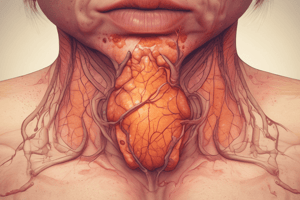Podcast
Questions and Answers
Which symptom is characterized by sudden, uncontrolled movements?
Which symptom is characterized by sudden, uncontrolled movements?
- Abdominal pain
- Erythema
- Unexplained epistaxis
- Chorea (correct)
What does unexplained epistaxis refer to?
What does unexplained epistaxis refer to?
- Skin rash due to allergic reaction
- Nosebleeds without a clear reason (correct)
- Abdominal discomfort without known cause
- Severe headaches of unknown origin
Which of the following indicates inflammation of the skin that may be red and swollen?
Which of the following indicates inflammation of the skin that may be red and swollen?
- Abdominal pain
- Erythema (correct)
- Chorea
- Epistaxis
Which condition is commonly associated with discomfort in the stomach area?
Which condition is commonly associated with discomfort in the stomach area?
What is the term for a skin condition that may present as a rash and is associated with infective processes?
What is the term for a skin condition that may present as a rash and is associated with infective processes?
What is the typical size range of nodules?
What is the typical size range of nodules?
Which characteristic is NOT associated with nodules?
Which characteristic is NOT associated with nodules?
What is a distinguishing feature of nodules in relation to the skin?
What is a distinguishing feature of nodules in relation to the skin?
Which of the following best describes the tenderness of nodules?
Which of the following best describes the tenderness of nodules?
In what settings are bed activities like quiet play recommended?
In what settings are bed activities like quiet play recommended?
Which of the following activities is NOT appropriate for quiet play in bed?
Which of the following activities is NOT appropriate for quiet play in bed?
What size classification does a nodule fall under?
What size classification does a nodule fall under?
What is a potential benefit of including bed activities in a patient's routine?
What is a potential benefit of including bed activities in a patient's routine?
Which of the following best describes the purpose of quiet play in bed activities?
Which of the following best describes the purpose of quiet play in bed activities?
Which valves are most commonly affected by rheumatic carditis?
Which valves are most commonly affected by rheumatic carditis?
What are common symptoms associated with rheumatic conditions?
What are common symptoms associated with rheumatic conditions?
How is rheumatic arthritis characterized in terms of joint involvement?
How is rheumatic arthritis characterized in terms of joint involvement?
In addition to heart symptoms, which of the following might occur in a patient with rheumatic conditions?
In addition to heart symptoms, which of the following might occur in a patient with rheumatic conditions?
Which of the following is a characteristic symptom of rheumatic carditis?
Which of the following is a characteristic symptom of rheumatic carditis?
What is a primary benefit of allowing parents to carry on their normal routine at home?
What is a primary benefit of allowing parents to carry on their normal routine at home?
Which outcome is least likely when parents are allowed to maintain their normal routines?
Which outcome is least likely when parents are allowed to maintain their normal routines?
How does allowing parents to uphold their normal routine contribute to the household?
How does allowing parents to uphold their normal routine contribute to the household?
What is a potential disadvantage of not allowing parents to maintain their normal routines?
What is a potential disadvantage of not allowing parents to maintain their normal routines?
In what way can maintaining a normal routine at home affect children's behavior?
In what way can maintaining a normal routine at home affect children's behavior?
What is the primary focus of the North private college of Nursing?
What is the primary focus of the North private college of Nursing?
Which type of institution is the North private college of Nursing?
Which type of institution is the North private college of Nursing?
What can students expect to study at the North private college of Nursing?
What can students expect to study at the North private college of Nursing?
Which best describes the purpose of the North private college of Nursing?
Which best describes the purpose of the North private college of Nursing?
What type of education does the North private college of Nursing provide?
What type of education does the North private college of Nursing provide?
Flashcards
Chorea
Chorea
A type of facial tic characterized by involuntary, rapid, jerky movements. It's a symptom of a wide range of conditions, including Huntington's disease.
Epistaxis
Epistaxis
Uncontrolled bleeding from the nose, also known as a nosebleed.
Erythema
Erythema
Redness of the skin caused by inflammation.
Abdominal Pain
Abdominal Pain
Signup and view all the flashcards
Erythema marginatum
Erythema marginatum
Signup and view all the flashcards
Subcutaneous nodules
Subcutaneous nodules
Signup and view all the flashcards
Which valves are affected in Rheumatic Carditis?
Which valves are affected in Rheumatic Carditis?
Signup and view all the flashcards
Migratory polyarthritis
Migratory polyarthritis
Signup and view all the flashcards
Anorexia and weight loss
Anorexia and weight loss
Signup and view all the flashcards
Pallor
Pallor
Signup and view all the flashcards
Nodules
Nodules
Signup and view all the flashcards
Nodules: Tenderness
Nodules: Tenderness
Signup and view all the flashcards
Nodules: Skin Attachment
Nodules: Skin Attachment
Signup and view all the flashcards
Nodules: Skin Lesion
Nodules: Skin Lesion
Signup and view all the flashcards
Nodules: Causes
Nodules: Causes
Signup and view all the flashcards
Quiet play
Quiet play
Signup and view all the flashcards
Bed Activities
Bed Activities
Signup and view all the flashcards
Home Play
Home Play
Signup and view all the flashcards
Hospital play
Hospital play
Signup and view all the flashcards
Quiet play is important in both home and hospital
Quiet play is important in both home and hospital
Signup and view all the flashcards
What is the North Private College of Nursing?
What is the North Private College of Nursing?
Signup and view all the flashcards
What kind of college is the 'North Private College of Nursing'?
What kind of college is the 'North Private College of Nursing'?
Signup and view all the flashcards
Allow parents normal routine at home
Allow parents normal routine at home
Signup and view all the flashcards
Balancing support for children with special needs and parental routine
Balancing support for children with special needs and parental routine
Signup and view all the flashcards
Improving quality of life for families with special needs children
Improving quality of life for families with special needs children
Signup and view all the flashcards
Study Notes
Nursing Management of Children with Rheumatic Fever
- Definition: Rheumatic fever is an inflammatory disease affecting connective tissues, mainly affecting joints and the heart, and less frequently the central nervous system, skin, and subcutaneous tissues.
Causes
- Group A β-hemolytic streptococcal (GABHS) upper respiratory tract infection (URI) is the primary cause.
Assessment Criteria (Jones' Criteria)
- Major Criteria:
- Carditis (inflammation of the heart)
- Polyarthritis (migratory joint inflammation)
- Chorea (involuntary muscle movements)
- Erythema marginatum (characteristic skin rash)
- Subcutaneous nodules (small, painless lumps under the skin)
- Minor Criteria:
- Fever (38-39°C)
- Arthralgia (joint pain without inflammation)
- Unexplained epistaxis (nosebleeds)
- Abdominal pain
- Weakness, fatigue, anorexia, pallor, and/or weight loss
Rheumatic Carditis
- The mitral and aortic heart valves are the most commonly affected valves.
Rheumatic Arthritis
- Migratory, affecting more than one joint during the first 1-2 weeks of the febrile period.
- Affected joints are swollen, red, hot, and painful.
- Large joints such as knees, hips, shoulders, wrists, and elbows are primarily affected.
Rheumatic Chorea (Sydenham's Chorea)
- Affects the central nervous system.
- Characterized by involuntary, sudden, irregular muscle movements.
- Anxiety can exacerbate these movements.
- Rest often relieves movements.
Subcutaneous Nodules
- Develop rarely in children with severe or repeated rheumatic fever.
- Generally small (0.5-1 cm), firm, and not tender.
- Often found over the extensor surfaces of joints (e.g., elbows, knees).
Erythema Marginatum
-
Consists of undifferentiated macules (spots).
-
Typically found on the trunk and inner aspects of extremities.
-
Lesions are non-pruritic (not itchy).
-
Diagnostic Procedures
-
Requires two major criteria or one major and two minor criteria, along with evidence of a preceding GABHS infection.
-
Laboratory tests:
- Elevated antistreptolysin-O (ASO) titer (normal 200-400; above 400 is abnormal).
- Elevated erythrocyte sedimentation rate (ESR).
- C-reactive protein (CRP)
- Electrocardiogram (ECG)
- X-rays or radiographs.
Nursing Care Objectives
- Encourage compliance with drug regimens (e.g., antibiotics).
- Facilitate recovery from the illness.
- Provide emotional support.
- Prevent further disease development
Drug Regimens
- Encourage adherence to prescribed therapy.
- Consider monthly injections instead of daily oral antibiotics if compliance is poor.
Facilitating Recovery
- Educate the child and parents regarding the need for bed rest to minimize the inflammatory process impact, especially on the heart.
- If metabolic and cardiac demands are low, tissue damage may be minimal.
Managing Fever
- Encourage fluid intake to prevent dehydration.
- Avoid overhydration as it can overburden the heart.
Diet
- Initially, provide liquid or soft foods in small, frequent portions to minimize chewing effort.
- Gradually increase the diet to meet nutritional requirements.
- Avoid overfeeding to reduce heart load.
Pain Management
- Administer anti-inflammatory agents (e.g., aspirin) to alleviate pain from carditis or polyarthritis.
- Alternate warm and cold compresses on affected joints to reduce swelling and pain.
Preventing Injury (Chorea)
- Assist the child during walking.
- Provide the child with soft foods (finger foods, spoons, avoid knives).
- Raise bed rails to prevent falling.
- Consider restraining the child if necessary, but with padding for safety.
Emotional Support
- Explain the illness and treatment to both the child and parents.
- Encourage ways to carry out regular bed activities (quiet play) while in the hospital or at home.
- Allow the parents to continue normal routines wherever possible.
- Encourage contact from other children (classmates, siblings, peers).
Disease Prevention
- Remain alert to children who display symptoms of streptococcal sore throat.
- Upon diagnosis of streptococcal infection, administer antibiotics (single dose benzathine penicillin injection or daily oral penicillin or erythromycin for 10 days).
- Educate parents about the importance of completing the full course of antibiotics to eradicate the disease.
- Support the parents and advocate for the implementation of massive screening programs and throat cultures for early detection and treatment to prevent future cases.
Studying That Suits You
Use AI to generate personalized quizzes and flashcards to suit your learning preferences.




